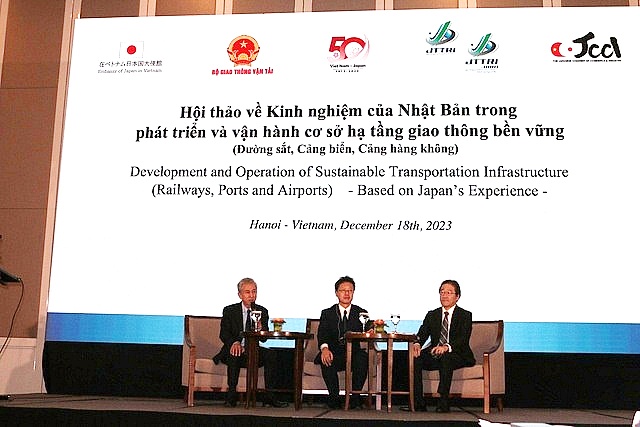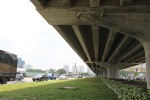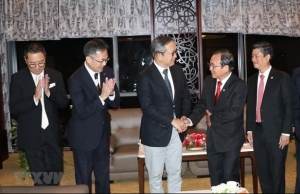Vietnam and Japan seek to strengthen transport infrastructure cooperation
The event attracted the participation of representatives from the Japanese Ministry of Land, Infrastructure Transport and Tourism, Vietnam’s Ministry of Transport, and experts on airports, railways, and seaports.
 |
It was one of many events commemorating the 50th anniversary of diplomatic relations between Vietnam and Japan, and aims to promote cooperation on transportation infrastructure.
Nguyen Danh Huy, Vietnamese Deputy Minister of Transport, said that Vietnam has identified a breakthrough in infrastructure as one of three strategic keys to building a synchronous, modern, and highly connected system, meeting the country’s requirements for socioeconomic development, defence, and security. During the past term, Vietnam has achieved many important milestones in this area, including roads, railways, and airports.
“To concretise the development goals, we will focus on investment and developing the system in accordance with the five national master plans for roads, maritime operations, railways, inland waterways, and airports,” he added.
“This is an important basis for Vietnam to call for cooperation, support, and investment from international partners, especially those from our comprehensive strategic partner, Japan,” he noted.
According to Pham Hoai Chung, deputy director of the Transport Development and Strategy Institute under the Ministry of Transport (MoT), all five sectors’ planning has been approved and the MoT is implementing detailed plans and projects to enable the synchronous and methodical development of the transportation system in Vietnam.
“The investment needs for the five transport segments up to 2030 total about $85.2 billion, of which nearly half is for railways, the maritime industry, and aviation,” he added.
Watanabe Shige, deputy chief of Mission, Minister, Embassy of Japan in Vietnam, said that Japan’s official development assistance for Vietnam has contributed to the nation’s development. The two sides asserted that they will continue to cooperate and further promote infrastructure projects in Vietnam.
He elaborated that Japan has experience in developing high-speed railways with high stability and safety. In terms of ports, Japan has been involved in many public-private partnership projects associated with coastal industrial parks.
Japanese businesses have participated in numerous transport projects in Vietnam, including Noi Bai International and Tan Son Nhat International Airports. They also invested in Cai Mep, Tien Sa and Lach Huyen ports, as well as the metro line 1 in Ho Chi Minh City.
According to the MoT, by 2030, Vietnam aims to build about 5,000km of highways, upgrade its existing railway routes, develop its port system to handle cargo volumes from 1.14 to 1.42 billion tonnes, and create a system of 30 airports with 14 operating internationally. As such, the country is seeking international cooperation to achieve the targets.
 | Japan pours ODA into transport infrastructure Transport infrastructure has continued to benefit from Japan’s official development assistance funds. |
 | Transport Ministry pilots IT application in passenger transport The Ministry of Transport has asked the Government to permit pilot implementation of a project to apply information technology in the management of contract-based passenger transportation (Grabcar) developed by GrabTaxi Vietnam. |
 | Japan pledges to support major transport projects in Binh Duong Japanese Ambassador to Vietnam Yamada Takio has told leaders of the southern province of Binh Duong that his country supports transport projects connecting Binh Duong with regional localities and cooperation in investment for major projects using Japanese ODA. |
What the stars mean:
★ Poor ★ ★ Promising ★★★ Good ★★★★ Very good ★★★★★ Exceptional
Related Contents
Latest News
More News
- Ho Chi Minh City launches plan for innovation and digital transformation (February 25, 2026 | 09:00)
- Vietnam sets ambitious dairy growth targets (February 24, 2026 | 18:00)
- Masan Consumer names new deputy CEO to drive foods and beverages growth (February 23, 2026 | 20:52)
- Myriad risks ahead, but ones Vietnam can confront (February 20, 2026 | 15:02)
- Vietnam making the leap into AI and semiconductors (February 20, 2026 | 09:37)
- Funding must be activated for semiconductor success (February 20, 2026 | 09:20)
- Resilience as new benchmark for smarter infrastructure (February 19, 2026 | 20:35)
- A golden time to shine within ASEAN (February 19, 2026 | 20:22)
- Vietnam’s pivotal year for advancing sustainability (February 19, 2026 | 08:44)
- Strengthening the core role of industry and trade (February 19, 2026 | 08:35)

 Tag:
Tag:
























 Mobile Version
Mobile Version